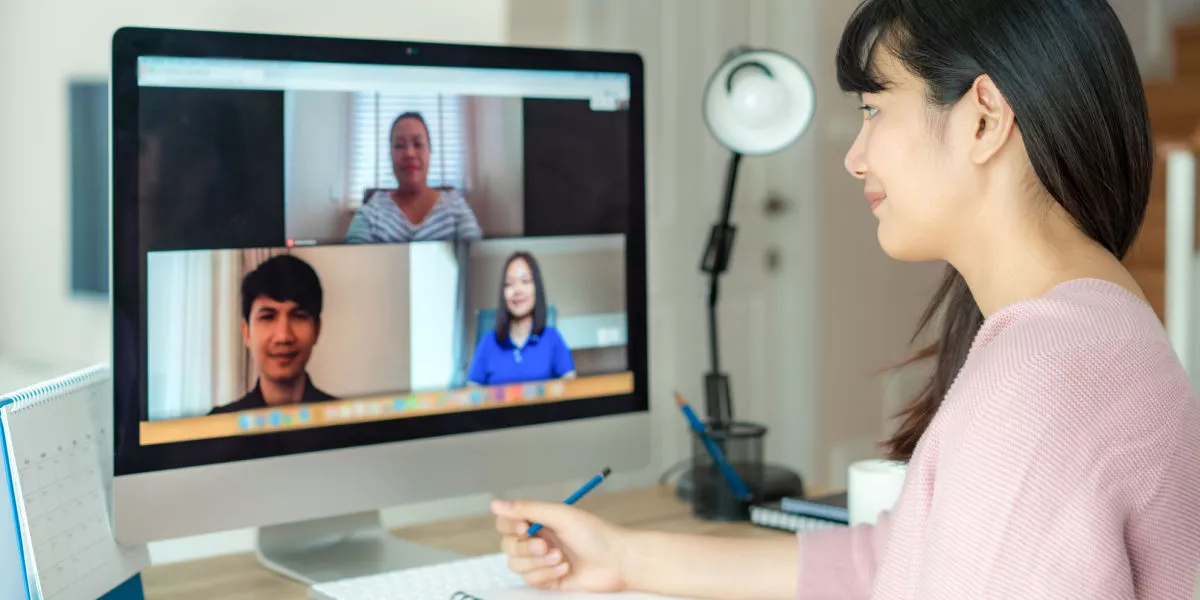How to master virtual job interviews

With the advancement of technology, more organisations are turning to virtual job interviews as an efficient and cost-effective way to recruit new talent. Today, virtual interviews are the wave of the future for recruiters.
In fact, in Alcami and Revelian’s recent Hiring Benchmark Report, the brands theorise that businesses will only continue to utilise virtual hiring tools and adopt the use of genuine video interviewing technologies.
A similar poll of US hiring managers, recruiters and HR professionals by TopResume also found that 33% of professionals screen candidates for jobs exclusively via online methods.
To further emphasise just how far the remote hiring shift has come, only 21% of firms did some in-person interviews, mostly for final rounds, while a mere 20% of respondents stated that most of their company's interviews remained face-to-face.
In short, if you’re on a job hunt, or considering switching roles at some point down the track, it’s very likely that virtual interviews will be part of your job search experience. Here’s what you need to know to make your virtual interview experience a smooth one.
More job interviews across Australia
With job vacancies up 95% this year compared to pre-pandemic, according to SBS, Australian companies are jostling to find top talent, meaning more job opportunities for candidates.
Another driver putting applicants in the box seat is the so-called Great Resignation, referring to the large number of workers who quit their jobs in recent years. This phenomenon has already witnessed thousands of Australian workers leave unfulfilling jobs, change careers, or focus on life and pursuits outside work.
It has also led to the growth of a new trend sweeping workplaces across the country known as ‘quiet quitting’ – the practice of workers doing only what they’re paid for during business hours and nothing more until they find a more fulfilling job.
As global HR firm, Robert Half explains in its 2023 hiring and employment trends report: “Job openings are still near historic highs, and the pool of job seekers continues to shrink. Quit rates have also stayed high, and job openings still outnumber candidates nearly 2-to-1”.
With an increase in open roles comes an increase in interviews. This is reflected in data collected by video interviewing tool, HireVue which in 2022 reported over one million Australian job seeker interviews conducted via the platform.
Why job interviews are migrating online

There are multiple reasons for businesses to move their hiring processes online. Firstly, virtual interviewing can save companies valuable time, enabling them to cast their net wider for talent and choose from a longer list of potential candidates. Furthermore, remote interviews are logistically easier to organise than on-site as there is no limit on geographical location. This can in turn reduce costs for venues, etc.
What’s more, virtual job interviews enable employer stakeholders to sit in from various offices that otherwise, may not have been able to attend. This is especially useful for multinationals. Also, if relevant employer stakeholders are unavailable, or if time zones make everyone sitting in on the interview unfeasible, online job interviews can be recorded and watched at a suitable time later on.
But the advantages are not all on the employer’s side. Candidates can also benefit from time savings. The scheduling flexibility and convenience for candidates to log on for an interview, versus taking hours out to prep, travel and meet in person, is a key advantage.
However, it’s not a one-size-fits-all scenario. Virtual interviews do have the potential to be a barrier to entry for low-income candidates, who don't have stable internet or an up-to-date PC with a webcam. The same goes for candidates who may not be technologically savvy, making it potentially difficult for them to use conferencing software.
With that in mind, here’s a comprehensive guide to virtual interviews with what you need to know about giving yourself the best chance at landing a job remotely.
How to prepare for a virtual job interview

In today's digital world, learning how to effectively prepare for a virtual job interview is essential. With more and more businesses transitioning from in-person interviews to remote ones, nailing your online interview has become increasingly important.
Whether you're applying for an internal promotion or striving to secure a new role with another company, here are six ways you can set yourself up for success.
1. Have your CV and files handy
Make sure your resume (and cover letter if you submitted one) is on hand for the virtual job interview. A video interview done from home will often involve you taking notes or referring to your CV, so ensure it’s there with you to refer to easily.
It’s also a good idea to print physical copies so you don’t have to toggle between screens on the call, as this can be distracting for everyone involved. A printer such as the Brother DCP-J1200W is a great solution to prepare these for you.
Consider having a desktop scanner such as the Brother ADS-3100 in an easy-to-access location so you can quickly and effortlessly share physical documents like your portfolio in real-time.

2. Get familiar with the role
Don’t forget to do your homework on the company and role before attending your interview. There’s no need to ‘go into the lab’ here, but you should be across the company’s basics, its main players, and the nature of the job you’re applying for. Thoroughly review the position’s job description and identify who will be on the call ahead of time.
3. Choose the right location
Remember, a job interview is all about creating the right impression with the employer. This doesn’t include giving them a window into a messy home life. Make sure you set up the interview call in a quiet, tidy space where you’re unlikely to have interruptions. Your home office or a study nook are ideal locations for this.
Make it a priority to check your lighting before you jump on the interview call. The key issue here is backlighting. Make sure you light yourself from the front because if your light source is behind you, it could make it difficult to see. A handy tip from Harvard Business Review suggests positioning a desk light towards your face.
You’ll also need to factor in noise and possible disturbances at home and seek to minimise them as much as possible. In part, this means giving your housemates (if you live in a shared house) or family a heads-up ahead of time about your interview and asking them to stay quiet for the time.
4. Prepare your tech ahead of time

Turning up late to a job interview has always been a critical error, and it remains so in an online setting. Making sure you log in on time means getting your tech set up correctly – and testing it all – before the interview itself.
If you’re unfamiliar with the specific software that will be used for the virtual interview, make sure you have downloaded it and practised using it prior to avoid delays or glitches entering the meeting room.
Getting the tech side right also extends to backgrounds and profile pictures. If you’ve been hosting Zoom calls with friends it’s ok to have a light-hearted background set, but that is likely not the impression you want to have with a prospective employer.
There is also the practical side of things to consider. It will likely be hard for the interviewer to stay focused if they’re distracted by your background display.
A pair of noise-cancelling headphones with a microphone is also a good idea, enabling you to hear and be heard clearly.
5. What to wear
Just because you are taking the interview at home, doesn’t mean you get to do it in your pyjamas or tracksuit. The key to remember here is that your interview attire should be just the same as what you would wear to a face-to-face interview.
Of course, there is the temptation to just dress up your top half and stay casual from the waist down. However, this approach comes with risks and should be done with caution. Job interviews can get candidates nervous and you wouldn’t want to stand up to, say, grab a glass of water, only to reveal your lower half is inappropriately dressed. On Line Recruitment also advises that wearing a complete professional outfit can help to boost your confidence.
6. Consider doing a test run
To make sure you’re glitch-free before your interview, it’s worth considering a test run with a friend or family member. That way you can check things like internet connection strength, time lag, microphone, volume, lighting and exterior noise.
If you already know the software platform to be utilised for the video interview, why not flick an invite to a friend, and do a trial to ensure the link opens up and connects properly? You may want to have a glass of water handy in case nerves give you a case of a dry throat.
Tips during a virtual job interview

Once you’re all set up and good to go, keep these five tips top of mind to help perform at your best during the virtual job interview.
1. Eye contact is key
Just like in-person, it’s important to engage your interviewer to create rapport and personal connection. Eye contact helps here, and so even though it may feel strange staring at the little dot of your computer webcam, you’ll present as more engaged with the interviewer.
By contrast, it’s easy to get caught up staring at your reflection, with many people during video calls finding it hard not to fixate entirely on themselves. This can make you seem disengaged, and potentially even aloof.
2. Know some details about the company
You don’t need to go overboard by knowing the fine details of the company you’re interviewing at, but demonstrating that you understand the basics of what they’re all about, and their values will help show that you’re committed and switched on.
3. Consider your environment
The key is to make your home, or wherever you’re conducting the interview, appear as professional as possible. That means setting yourself up in a room free of clutter. Keep a clear background to retain the focus on you.
4. Ask the right questions
Without the spark of an in-person meeting, a virtual job interview can get monotonous. On this front, a challenge to be aware of is to keep the conversation upbeat. A good way to do this, as recommended by Harvard Business Review, is to show ‘genuine interest’ in your interviewer by engaging them with questions related to the company and role. Another simple method is to find common interests to chat about.
There’s, unfortunately, no checklist of the right questions to ask during a virtual job interview. Instead, use this as an opportunity to clarify items in the job description, about the company culture and what you can expect if you were to work there.
5. What not to do in an online job interview
The big tip here is to show that you are genuinely interested in what the employer is saying to you. Remember, minor gestures come across as amplified in a video conference setting so fidgeting, looking offscreen, or toggling to other windows will create an impression you’re distracted, and may hurt your chances of landing the role.
We’ve already covered being late but the same rule also applies to being too early. Logging into an interview too early may rush the interviewer and add a layer of pressure.
And the golden rule for any interview, don’t lie. Be transparent in your skills and experience and take accountability rather than blaming others. As put nicely by Indeed, express your desire to learn new things and commitment to improving your work performance on the job.
Reviewing how your online job interview went

After the interview is done, there’s very little you can do to change the result and put yourself in a better position to get the job. What you can do though, if you’re imprudent, is to get the employer or recruiter offside by repeated follow-up emails and calls.
As a general rule of thumb, after the interview is finished, conduct a self-review to go over what questions you found tough to answer in case you come across them in the future.
After that, it’s ok to write a thank you note to be sent within two days of the interview, then call if you haven’t heard from the employer within the expected period.
No matter how your job search goes, if you put your best foot forward in terms of preparation for a virtual interview, you'll be in the best position for success.

Resource Library
Be the first to receive exclusive offers and the latest news on our products and services directly in your inbox




